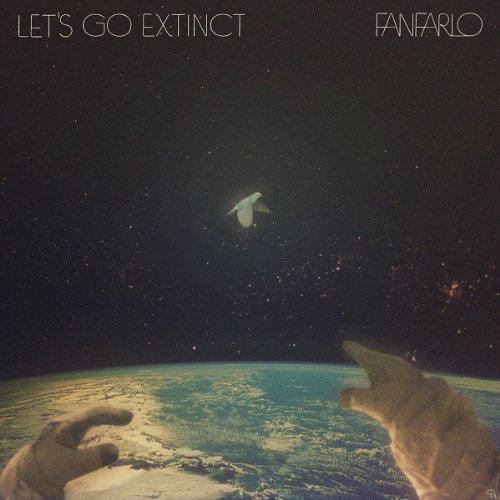"There is gold beneath the ashes," sings Simon Balthazar on ‘The Beginning and the End’, the penultimate track on Fanfarlo’s excellent if flawed third album. "We have mouths to feed and Utopia to reach." These are fine, optimistic sentiments on an album that is generally thoughtful, uplifting and musically engaging, packed with deceptively complex, melodic songs that stimulate the mind and the senses alike. Yet, as indicated by its title, it’s a record that also seems sadly on the verge of giving up entirely.
Let’s Go Extinct is a concept album, though not one with a single, overarching narrative, like Tommy, SF Sorrow or Ziggy Stardust. There are no recurring characters, and no stories being told. Instead, there is a common theme linking the songs; nothing less than the origins, purpose and eventual conclusion of all life on earth, with the nature of human consciousness thrown in for good measure. The band’s driving force, the London-based Swedish songwriter Balthazar, has said that all the songs they came up with in preparation for the new album seemed to deal with questions related to the theory of evolution- "Where the hell are we, and what are we going to do next?" And also, "the weirdness of being this thing we call a person and the double weirdness of other people."
Co-produced with Welsh wizard (and recent Julian Cope / Black Sheep affiliate) David Wrench, Let’s Go Extinct however is no dry and difficult math-rock scientific treatise. Instead, the sound the band have conjured up is pure pop; like a more effervescent British Sea Power crossed with a focussed, streamlined Super Furry Animals, niced up with a shot of jazzy 1980s plastic soul and a touch of 1950s lounge exotica courtesy of Martin Denny or Raymond Scott.
Opener ‘Life In The Sky’ considers the theory that the "virus" of life was brought to this planet in molecular form on a meteorite, and that we are the ultimate result of this infection. Balthazar sees this as the cause of our non-specific sense of universal, existential loneliness; the unconscious knowledge that we are all "a stranger, far away from home." But all of this is set to a throbbing drivetime groove that even Steve Wright-in-the-afternoon could get behind, anthemic jabs of trumpet and a swooning, melancholic chorus. ‘Cell Song’ touches on Gaia theory, and the notion that consciousness and sentient life is the way that the earth observes itself, and also that we are all ultimately inter-connected: "we have a contract, yes we have each other’s backs, we have a promise but one day we’ll fall apart."
This is expanded upon in ‘Myth of Myself (A Ruse To Exploit Our Weaknesses)’ which – inspired by Alan Watts’ seminal extrapolations of Buddhist teachings – explores the useful but also destructive illusion of individuality. "Like a plastic gun full of empty threats… it pretends we are apart, not just one but two." Set to a gorgeous soft-focus backing of piano, flute and violin, the song builds to Balthazar’s impassioned screams of "It’s got to die!"
‘A Distance’ sounds like some mid-80s pop mirage; Talking Heads, Simple Minds and the Blow Monkeys all blurring together in a wash of brat pack movie synths, faux-African percussion and a wine bar saxophone snaking through cooing female backing vocals. Who would have thought this could be such a good thing? On ‘We’re The Future’ and ‘Landlocked,’ Fanfarlo even take the mystifying influence du jour – Fleetwood Mac in their late 80s, Buckingham n’ Nicks led Tango In The Night incarnation – and turn it into something decent and imaginative, even if they do still bring to mind images of teased-up bouffant hair and Armani jackets with the sleeves rolled up to the elbow.
If this was the 80s however, the apocalyptic visions of ‘Painting With Life’ would have been hammed up to somewhere beyond the Thunderdome, rather than treated with the sensitive, country-tinged sadness displayed here, even if the song does eventually explode into a widescreen orchestral climax. But while the instrumentation and arrangements are never less than breath-taking throughout, sometimes the vocal melodies can seem somewhat flat, linear and one-dimensional compared to the inventiveness and variety displayed in the music. Balthazar generally sticks within the same up-and-down, two-by-four patterns, and the result is that there’s little that actually sticks in your head after the record has stopped playing.
Maybe though this is appropriate to the album’s themes; to perform a complex, intricate dance and then disappear, leaving nothing behind. The concluding title track advocates the voluntary extinction of the human race, stating that "It’s clear the wheels have turned; we’re standing in the way of ourselves, the world will go on without us." The music, too, has an air of melancholy resignation. Throughout the record, negative and positive voices have interwoven, and while ‘We’re The Future’ seemed to argue that human evolution was still very much an ongoing process, the negativity seems to have ultimately won out, and this song seems an unnecessarily defeatist note to end on.
Is this what the album has been leading up to; the notion that the grand experiment called human existence has been a failure, and that a shrugging suicide is now the best solution? A record review isn’t the place to argue this point, especially when it would colour too much my opinion on what’s largely an enjoyable and ambitious LP. Yet the song seems indicative of a corrosive despair that has punctured far too much contemporary music, leading not to righteous anger and a desire to change things but dissipation, a leaking away of essential energy. I like this record; it shows much in the way of human potential. So let’s not go extinct just yet, eh?


